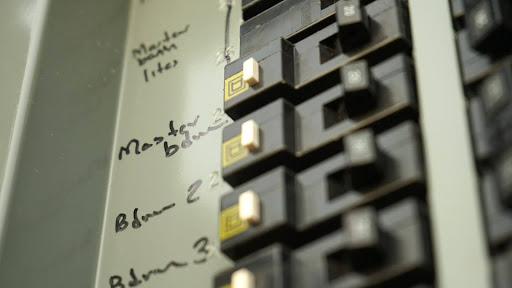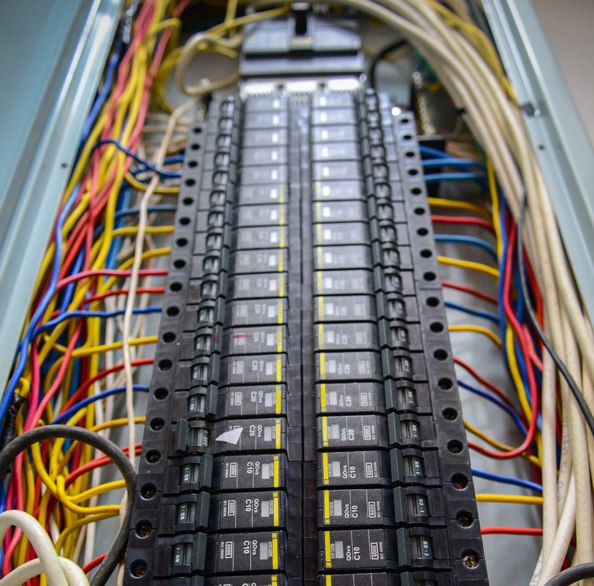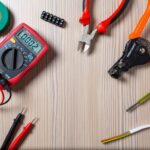As homes evolve to accommodate more electronics and modern appliances, you may wonder how to upgrade your electrical panel. An outdated electrical panel may be unable to handle today’s electricity demands, potentially leading to frequent circuit breaker trips or fire hazards. If you’re dealing with these issues or planning a major renovation, it may be time for an electrical panel upgrade.
However, upgrading your electrical panel isn’t a DIY project. While it may be tempting to cut costs, this job requires a licensed electrician due to the complexity and the risk involved. In this guide, we’ll cover everything you need to know about how to upgrade your electrical panel, including costs, code requirements, and why it’s crucial to hire professionals.
Why You Should Upgrade Your Electrical Panel
There are several reasons why you need to upgrade your electrical panel. An outdated panel can lead to a host of problems, such as:
- Frequent Breaker Trips: If your circuits can’t handle the load, they will trip frequently, cutting off power to prevent overheating.
- Inadequate Power for Modern Devices: Modern appliances like HVAC systems, electric vehicles, and high-tech gadgets require more power than older panels can provide.
- Safety Concerns: Old or faulty panels are a safety hazard, increasing the risk of electrical fires and shocks.
These issues highlight why knowing how to upgrade your electrical panel is crucial for modern homeowners.
Do I Need a Permit to Upgrade My Electrical Panel?
Yes, you typically need a permit to upgrade your electrical panel. Electrical work is highly regulated, and you must comply with electrical panel upgrade code requirements. The permit ensures that your new panel meets all safety standards and is appropriately installed. Local regulations may vary, so you must work with a licensed electrician who understands the specific code requirements in your area.
Hiring a professional also ensures the work is done safely and legally. Electrical work can be hazardous and in most regions, only licensed electricians can legally perform panel upgrades.
Can a Homeowner Replace an Electrical Panel?
While some homeowners may be handy with home repairs, replacing or upgrading an electrical panel is not something you should do yourself. Can a homeowner replace an electrical panel? Legally, in most areas, the answer is no. Beyond the legal restrictions, electrical work involves high voltage and complex wiring, making it dangerous for anyone who needs proper training. Attempting to do this yourself can result in injury or property damage, and if it’s done incorrectly, your home’s electrical system could become unsafe.
Hiring a professional ensures that your electrical panel is replaced safely, in compliance with local building codes, and efficiently—reducing the risk of complications.
What is Structured Wiring?
Many modern homeowners are exploring structured wiring systems in addition to upgrading their electrical panels. But what is structured wiring? Structured wiring is a system that consolidates all your home’s data and communication wiring into one centralized panel, allowing for seamless integration of your internet, security systems, television, and other devices.
When upgrading your electrical panel, consider installing structured wiring to future-proof your home and support your electronic needs. While structured wiring is not necessary for all homes, it can significantly improve the efficiency and convenience of your home’s electrical system.
The Pros and Cons of Upgrading Your Electrical Panel

Upgrading your electrical panel has many benefits, but it’s also important to be aware of the potential drawbacks. Let’s take a look at the pros and cons of upgrading your electrical panel:
Pros:
- Increased Safety: An upgraded panel ensures your electrical system meets modern safety standards, reducing the risk of electrical fires and shorts.
- Improved Power Supply: A new panel can handle the electricity demands of modern appliances and gadgets, providing consistent power.
- Higher Home Value: A safe, modern electrical system increases the overall value of your home, which is important if you plan to sell.
Cons:
- Cost: The electrical panel upgrade cost isn’t insignificant, especially if additional repairs or upgrades are required.
- Permit and Inspection Requirements: You will likely need to get permits and schedule inspections, which can add time and paperwork to the project.
While the upfront cost might seem like a drawback, the long-term benefits of safety and convenience far outweigh the negatives.
How Much Does It Cost to Upgrade an Electrical Panel?
One of the most common questions homeowners ask is, “How much does it cost to upgrade an electrical panel?” The electrical panel upgrade cost can vary depending on factors like the size of your home, the type of panel you’re upgrading to, and whether other repairs are needed. Upgrading an electrical panel can cost between $1,500 and $3,000.
If you’re wondering how much does a circuit breaker cost, individual breakers can range from $30 to $100, but the full panel upgrade typically includes labor, permits, and additional materials.
At West Bay Home Services in Florida, we strive to make electrical panel upgrades affordable by offering financing options. However, if you are not in Florida, search for “electrical panel upgrade near me” to get estimates from local electricians who understand your area’s specific requirements. Here’s what costs include:
- Initial Assessment: The electrician will first assess your current panel and your home’s electrical demands. They’ll then determine whether an upgrade is necessary and what size panel is appropriate for your needs.
- Obtaining Permits: The next step is to secure the necessary permits to perform the upgrade. As mentioned, you typically need a permit to upgrade your electrical panel, which ensures the work complies with local code requirements.
- Disconnecting Power: Before any work can begin, the electrician will turn off the power to your home to ensure safety during the installation.
- Removing the Old Panel: The existing electrical panel will be safely disconnected and removed. The electrician will also inspect the wiring to ensure it is still in good condition.
- Installing the New Panel: The new electrical panel is installed and connected to your home’s electrical system. This may include installing new circuit breakers and upgrading outdated wiring to meet modern standards.
- Inspection and Testing: After installation, the work will be inspected to ensure everything is up to code. The electrician will also test the system to ensure it works correctly.
- Restoring Power: Once everything is installed correctly and tested, the electrician will restore power to your home, ensuring that your new panel provides the necessary electrical capacity.
Things to Consider: Structured Wiring
Upgrading your panel is also an excellent time to consider installing structured wiring, especially if you’re building or renovating. Structured wiring systems provide your home with the infrastructure to handle future technology, from home automation to security systems.
How Long Does It Take to Upgrade an Electrical Panel?
The duration of an electrical panel upgrade varies, but typically, it takes anywhere from 4 to 8 hours to complete the installation. The process could take longer if additional work is required, such as rewiring or installing a new meter. Planning for this downtime is essential, especially if your home is highly reliant on electricity for appliances or medical devices.
The Importance of Hiring Professionals
When it comes to deciding how to upgrade your electrical panel, it must be stressed that this is a job for professionals. Attempting to upgrade your electrical panel or hiring an unlicensed handyman can lead to dangerous situations. Mistakes in wiring or installation can result in electrical fires, property damage, or severe injury. It’s always best to hire licensed residential roofing contractors with a proven track record specializing in electrical work.
Additionally, working with licensed professionals ensures the work will meet local electrical panel upgrade code requirements and pass any necessary inspections. It also provides you with peace of mind, knowing that your home’s electrical system is safe and up to date.
Ready to Upgrade Your Electrical Panel?
Upgrading your electrical panel is a necessary investment to keep your home safe and ensure it meets the demands of modern life. Whether you’re considering a panel upgrade to accommodate new appliances, prevent frequent breaker trips, or improve your home’s overall safety, this project is best left to the professionals. If you’re wondering how much to upgrade your electrical panel or need estimates for the electrical panel upgrade cost, start by contacting a licensed electrician. Don’t wait until electrical issues become a hazard. Contact a West Bay Home Services licensed electrician today to discuss your options for upgrading your electrical panel and ensure your home is equipped to handle future demands.
You May Also Like:






